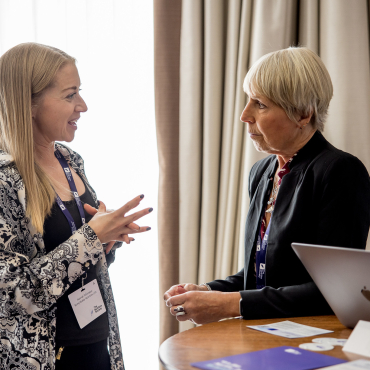Our Policies
The Nutrition Society is committed to being a leader and role model in equality, diversity and inclusivity (EDI) within a scientific learned society, nationally and internationally. The Society’s Board of Trustees will position EDI to be an integral component in the Society’s 2021 - 2026 Strategic Plan and ongoing activities. This aims to inspire all members and staff to excel as a Society and contribute in a meaningful way to the development of a fair and diverse wider society. In delivering the Strategic Plan, the Nutrition Society will continue to promote and uphold the highest ethical standards in, and in relation to, nutritional science.

Supporter policy
1. Introduction
This policy outlines the guidelines and procedures for establishing sponsorship and engagement relationships between The Nutrition Society (hereinafter referred to as ‘the Society’) and the non-profit and private sectors (hereinafter referred to as ‘supporters’). The Society recognises the importance of collaboration with these sectors to advance scientific research and achieve its mission, while maintaining transparency, integrity, and the highest ethical standards.
2. Purpose
The purpose of this policy is to:
- Define the principles and criteria for sponsorship and engagement.
- Ensure that all interactions with supporters align with the Society's mission and values.
- Promote transparency, accountability, and independence in all sponsored engagement activities.
- Mitigate conflicts of interest and maintain the integrity of the Society's scientific work.
3. Principles
The Society adheres to the following principles when engaging with supporters:
3.1. Independence and Integrity: The Society maintains full control over its events, programmes, research, publications, and decision-making processes. This is to ensure that the interests of supporters do not, or are perceived to, compromise the Society’s reputation as an independent learned society.
3.2. Transparency: All supporter agreements and engagements will be transparently disclosed to the public, stakeholders, and the Society's members, to the extent allowed by legal and contractual obligations.
3.3. Fairness and Non-Discrimination: Supporter opportunities will be made available to non-profit and private sector entities without discrimination based on industry, size, or financial capacity, subject to compliance with the Society's policies and ethical standards.
3.4. Ethical Conduct: Both the Society and supporters are expected to adhere to high ethical standards, including respecting human rights, environmental responsibilities, and applicable laws and regulations.
3.5 Disclaimer: The Society reserves the right to use a disclaimer for all activities defined within this policy. The disclaimer will state: ‘The Nutrition Society does not endorse the products, services, or views mentioned or discussed in this context. The information provided here is for general informational purposes only and should not be considered as professional advice, recommendation, or endorsement by The Nutrition Society. The Nutrition Society bears no responsibility for any consequences arising from the use, misuse, or interpretation of the information presented. Furthermore, any references made to specific products, services, or views are solely for illustrative purposes and should not be considered as an endorsement or promotion by The Nutrition Society.’
4. Supporter Categories
The Society offers the following supporter categories:
4.1. Financial Support: Supporters can provide monetary contributions to support the Society's conferences, programmes, and events.
4.2. In-Kind Contributions: Supporters may offer in-kind contributions, such as equipment, technology, or expertise, to support specific projects or initiatives.
4.3. Collaboration: Collaborative projects between the Society and supporters must uphold the principles of scientific independence and transparency.
4.4. Event Sponsorship: Supporters may not offer direct sponsorship of specific events or programmes organized by the Society.
4.5. Programme and Event Specifics: Examples of how this policy will be enacted across the Society’s programmes and events are at Annex A.
5. Approval Process
5.1. Supporter Approval: The Society reserves the right to continuously review and decide which supporter entities they choose to interact with. All proposed supporter agreements must be reviewed and approved by the Society's Treasurer and CEO, with the support of the Science Committee (who may from time to time form a sub-committee to undertake the review) or, in the case of The Society’s Academy, its Academic Advisory Board, ensuring alignment with the Society's mission and values. The Society’s Irish Section will ensure an equally rigorous process is followed. The Society’s Board of Trustees can, if required, act to make a final decision in cases where the Treasurer and CEO deem it necessary for additional consent.
5.2. Conflict of Interest Review: Members of the Society involved in supporter negotiations or decisions must disclose any potential conflicts of interest and recuse themselves from related discussions or decisions.
6. Disclosure
6.1. The Society shall maintain a public record of all supporters, sponsors and engagements, including the names of supporting entities and the nature of their contributions.
7. Termination of Sponsorships
The Society reserves the right to terminate supporter agreements if:
7.1. The supporter's actions or interests conflict with the Society's mission or ethical standards.
7.2. The supporter engages in activities that could compromise the Society's independence or integrity.
8. Monitoring and Reporting
The Society shall regularly review its sponsorship and supporter relationships to ensure compliance with this policy. An annual report on sponsorship and supporter activities and their impact on the Society's independence and mission shall be made available to the Society’s members and the public.
9. Amendments to the Policy
This policy may be amended by the Board of Trustees to reflect changes in the Society's priorities or evolving best practices in sponsorship and engagement.
10. Contact Information
For questions or concerns related to this policy, please contact:
Mark Hollingsworth, CEO, [email protected], +44 (0) 7961 201714
11. Effective Date
This policy shall be effective as of 15 October 2023 and supersedes any previous sponsorship and engagement policies.
By adhering to this Supporter Engagement Policy, the Society aims to maintain its commitment to its independence, scientific excellence and its mission while fostering productive collaborations with the non-profit and private sector in support of its goals.
Annex A
Supporter Engagement Policy
Events and Programmes
Introduction
This Annex outlines the various guiding principles which may apply to the Society’s Events and Programmes (Scientific Conferences, Member-led One Day Meetings, Webinars, MOUs, Partnership Agreements).
1. Scientific Content: Non-profit and private sector entities (known in this Annex as ‘Supporters’) may propose scientific content for conference satellite sessions/symposia and sponsored webinars, which are subject to review as per the policy 5.1.
2. Acknowledgement: Supporters are acknowledged in an agreed format for a webinar or in the programme at a conference, and on the Society website so that Society members can see who is supporting the event/session/resource. Conference or event attendees will retain the right to decide whether or not they attend a supported event/session/resource.
3. Use of Society’s Name and Logo: Supporters shall not refer to or use the Society’s name or logo in activities without prior written permission from the Society
4. Publications: Publication of a conference symposia write-up in Proceedings of the Nutrition Society journal is at the discretion of the Society’s Publications Committee and all papers are subject to full peer review. Each page of material published in PNS shall bear a disclaimer expressed in words that are at the sole discretion of the Society.
5. Commercial Activity: Supporters are not permitted to engage in commercial activity at conferences, including overt promotion of products or services within symposiums or webinars. The relevant agreed terms of sponsorship/supporter activity may provide for exemptions to this for exhibitions and non-symposium and webinar-supported activities.
6. Student travel bursaries: Supporters can finance students to attend. In return, the organisation logo is printed in the programme as with other supporters. Support of the bursary should be acknowledged on the Society’s website, and in the conference

Scientific Conduct and Research Policy
Working according to the principles of the UK Research Integrity Office’s (UKRIO) Code of Practice for Research (ref), Universities UK Concordat to Support Research Integrity (ref), and other relevant international principles, the Society and its members will:
- Uphold the highest standards of rigour and integrity in all aspects of research.
- Ensure that research is conducted according to appropriate ethical, legal and professional frameworks, obligations and standards.
- Support a research environment that is underpinned by a culture of integrity and based on good governance, best practice, and support for the development of researchers.
Furthermore, the Society will:
- Use transparent, timely, robust and fair processes to deal with allegations of research misconduct should they arise.
- Work together to strengthen the integrity of research and to review progress regularly and openly.

Environmental and Sustainability Policy
The Nutrition Society recognises that it has a responsibility to the environment beyond legal and regulatory requirements. The Society is committed to reducing its environmental impact and continually improving its environmental performance as an integral part of delivering its charitable objectives, its strategy, and operating methods, with regular review points. The Society encourages members, customers, suppliers, and other stakeholders to do the same.
In enacting this policy, the Society endeavours to:
- Continually improve and monitor environmental performance.
- Comply with and exceed all relevant regulatory requirements.
- Continually improve and reduce environmental impacts.
- Incorporate environmental factors into operating decisions.
- Increase employee awareness and training.

The Operating Environment
The Nutrition Society believes that it is essential to function in an environment that is fair and respectful. The Society is committed to operating and delivering its Strategic Plan priorities within such an environment which promotes the fair and respectful provision of feedback and is free from:
- Disrespect
- Discrimination and favouritism
- Abuse of power/authority
- Harassment
In delivering its Strategic Plan (2021 - 2026), the Society looks to support where feasible the UN Sustainable Development Goals,
in particular:
- Goal 4: Quality education
- Goal 5: Gender equality
- Goal 12: Responsible consumption and production
- Goal 13: Climate action
- Goal 16: Peace, justice and strong institutions
- Goal 17: Partnership for the goals

Ethical Behaviour and Standards of Conduct
The strategic priorities of the Society, detailed within the Strategic Plan (2021-2026), are underpinned by embedded ethical principles, behaviours and standards of professional conduct. To reflect the Society’s ethical principles, the highest standards of conduct, competence and behaviour are expected of all members and employees of The Society. The Society looks to all partners and stakeholders to reciprocate in meeting these standards in spirit and in practice.
The basic principles of ethical behaviour and standards of conduct of The Society (its members and employees) are based upon the fundamental freedom to speak, think and choose, and are demonstrated through:
Integrity. The demonstration of the highest standards of integrity and acting in good faith, with intellectual honesty and fairness.
Accountability. The obligation of everyone to be answerable for his/her actions and decisions, and to accept responsibility for them. To respect confidentiality, and the correct use of The Society’s resources.
Independence and Impartiality. To act with impartiality and professionalism, ensuring that the expression of personal views and convictions do not compromise performance of duties. Bias, prejudice, conflict of interest, or undue influence must not be permitted to supersede professionalism of conduct.
